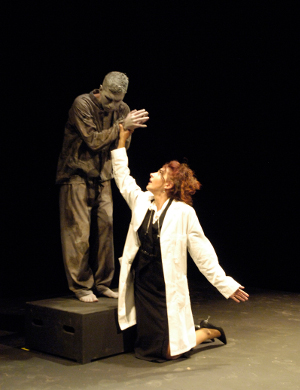You have no items in your cart. Want to get some nice things?
Go shopping
With Corbynites poised for an unanticipated grassroots win in the Labour party leadership elections and far-left socialism now a trending topic on Twitter, the two plays in this short double bill – of Samuel Beckett’s Catastrophe and Václav Havel’s Private View – resonate in a blackly distorted reflection of their original political intent. The plays are presented by the up-and-coming Blue Rider Group, who first performed a pair of short Tom Stoppard plays at the King’s Head Theatre. (Their name, after the German expressionist group associated with Wassily Kandinsky, makes their selection of Beckett a little ironic: Beckett was critical of the Russian painter, believing that his desire to liberate art’s expressive possibilities was cancelled out by his excessive formalism.)
Written during the final gasps of European communism in the late ’70s and ’80s, both plays deal with the idea of social normalisation and the comprehensive state-manipulation of the individual. However, while Havel and Beckett were both nominally opposed to state communism, the issues they expose are no less relevant in a world dominated by right-wing hegemony.
Here in the UK, the political landscape has seemingly been dominated by a privileged elite for the best part of a decade, but it is only in the aftermath of May’s general election that the all-encompassing nature, and Cthulhu-like tendrils that make up the current political/media-owning class, are made truly palpable.
The trend to control social behaviours – demonising benefit scroungers, knighting bankers, blaming immigrants for economic difficulties, acquitting corrupt newspaper cronies – has created some small backlash in support for left-wing ideology but in the main only seems to strengthen the moral standard of those in lockstep with Daily Mail.
Consequently, the modern audience seems exhorted to translate the atmosphere of prescribed moral rectitude that permeates these plays into contemporary consumerist, capitalist culture.
The first of the plays in the double-bill, and the longer of the two, is Private View. Written in 1976 long before the erstwhile dissident and playwright led the Velvet Revolution and became president of Czechoslovakia, it is set entirely in the recently refurbished living room of perfect couple Michael (Mark Webb) and Vera (May Moore). The Drayton Arms’ intimate first floor theatre provides a suitable setting for the production, which by design is compressed and minimal; the performance from the trio of actors is uncomplicated, emphasising concept over delivery.
The play is one of three by Havel to feature his alter ego of Ferdinand Vanek – like him, a dissident playwright. Private View emphasises the contrast between Vanek, who has retained his integrity, and his friends Michael and Vera, who have exchanged theirs for material luxury. From the start the dialogue is gloriously awkward as Michael and Vera’s friend Ferdinand (Gary Tushaw) arrives for drinks and is instantly subjected to a tirade of well-meant advice. Tortuously, the couple highlight the various possessions they have chosen to feather their nest while imparting the wisdom of their moral vantage to the unfortunate Vanek.
The near-silent Vanek is forced to listen as unsolicited advice is foisted on him to “improve” his situation. A Swiss Toni-like tag team, the couple berate Ferdinand incessantly, ratcheting up the tension until the final dénouement in which the facade of their existence and their ostensible need for the dissident become apparent.
Beckett’s work is both more abstract and immediate as the issue of control plays out directly. The very brief play, written in French and premiered at the Avignon Festival in 1982, follows the Director as he instructs his Assistant to make changes to the posture of the Figure arranged for show on a plinth.
Written and dedicated to Havel, the play was intended as an act of solidarity from Beckett highlighting his friend’s plight, imprisoned as he was at the time by the Czech authorities for his political views.
The idea of command and submission is explicit in every movement but as with all of Beckett’s work the precise meaning of these actions remains ambiguous. A final note of defiance from the statue-like Figure does nothing to seal this ambiguity but rather asks the viewer to look more closely at themselves and the powers that control them.
Catastrophe/Private View continues at the Drayton Arms Theatre until August 15. Tickets are £12 (concessions £10).

About Lochlan Bloom
Lochlan Bloom is a British novelist, screenwriter and short story writer. The BBC Writersroom describes his writing as ‘unsettling and compelling… vivid, taut and grimly effective work’. He is the author of the novel The Wave as well as the short fiction pieces – Trade and The Open Cage. He has written for IronBox Films, BBC Radio, Slant Magazine, Litro Magazine, Porcelain Film, EIU, H+ Magazine and Calliope, the official publication of the Writers’ Special Interest Group (SIG) of American Mensa, amongst others




